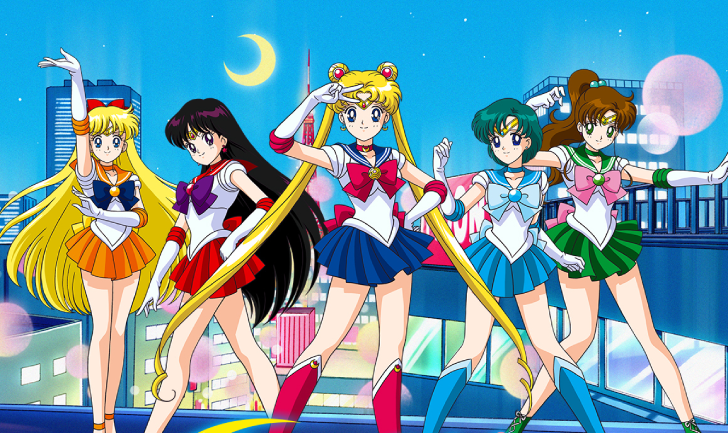Hiroshima Day
Hiroshima Day is observed annually on August 6th to commemorate the atomic bombing of Hiroshima, Japan, by the United States during World War II. On August 6, 1945, the U.S. dropped an atomic bomb, codenamed “Little Boy,” on the city of Hiroshima. This was the first time a nuclear weapon was used in warfare.

Sailor Moon Day
Sailor Moon Day is dedicated to the popular Japanese anime and manga series Sailor Moon, created by Naoko Takeuchi. Whether through a quiet rewatch of favorite episodes or participating in larger fan activities, Sailor Moon Day is a celebration of the enduring legacy of a beloved series.

Fresh Breath Day
National Fresh Breath Day, celebrated annually on August 6, is a lighthearted yet meaningful observance that promotes oral hygiene and the importance of fresh breath in everyday life. While the exact origin is unclear, the day is believed to have been started by dental professionals and oral health advocates to raise awareness about the social and health impacts of bad breath 1. Some sources credit Dr. Harold Katz, a dentist and bacteriologist, with founding the day in 1994 to combat halitosis and promote better oral care 2.

August 6 is a date marked by significant historical events across various fields, from world history to science and culture.
Historical Events
1787 – Constitutional Convention Debates the U.S. Constitution: On August 6, 1787, delegates at the Constitutional Convention in Philadelphia received the first draft of the United States Constitution. This draft, presented by the Committee of Detail, would undergo extensive debate and revision before being finalized on September 17, 1787. The Constitution established the framework of the federal government and is considered one of the most important documents in American history.
1806 – The Holy Roman Empire Dissolves: On August 6, 1806, the Holy Roman Empire was formally dissolved after over a thousand years of existence. Emperor Francis II abdicated his throne in the wake of defeat by Napoleon Bonaparte’s forces. This event marked the end of an empire that had played a central role in European politics and history since the early Middle Ages.
1890 – First Execution by Electric Chair: On August 6, 1890, the first execution by electric chair took place at Auburn Prison in New York. The condemned was William Kemmler, convicted of murder. The use of the electric chair was introduced as a more humane method of execution compared to hanging, though it has since been a topic of much debate and controversy.
1914 – Austria-Hungary Declares War on Russia: During the early stages of World War I, Austria-Hungary declared war on Russia on August 6, 1914. This declaration was part of a series of escalating events that pulled the major European powers into the conflict, leading to a global war that lasted until 1918.
1926 – Gertrude Ederle Swims the English Channel: Gertrude Ederle became the first woman to swim across the English Channel on August 6, 1926. She completed the 21-mile swim from France to England in 14 hours and 31 minutes, breaking the existing men’s record by nearly two hours. Ederle’s achievement was celebrated worldwide and marked a significant milestone in women’s sports.
1928 – The Prequel to the Great Depression: On August 6, 1928, U.S. President Calvin Coolidge announced he would not seek re-election. His decision paved the way for Herbert Hoover to become the Republican nominee and eventually president. Hoover’s term would soon be marred by the onset of the Great Depression, one of the most challenging periods in American history.
1945 – Atomic Bombing of Hiroshima: One of the most significant and tragic events in modern history, the United States dropped the first atomic bomb on the Japanese city of Hiroshima during World War II. The bomb, nicknamed “Little Boy,” caused unprecedented devastation, killing an estimated 140,000 people by the end of the year. This event played a crucial role in bringing about the end of World War II but also marked the beginning of the nuclear age, with lasting global implications.
1945 – The United Nations Atomic Energy Commission Established: On the same day as the Hiroshima bombing, the United Nations established the Atomic Energy Commission. This commission was tasked with addressing the dangers and potential uses of nuclear energy following the devastation caused by the atomic bomb, signaling the start of international efforts to manage nuclear weapons and energy.
1962 – Jamaica Gains Independence: Jamaica achieved full independence from the United Kingdom on August 6, 1962, after centuries of British colonial rule. This day is celebrated annually as Jamaica’s Independence Day, marking the nation’s emergence as a sovereign state within the Commonwealth.
1965 – Voting Rights Act Signed into Law: On August 6, 1965, U.S. President Lyndon B. Johnson signed the Voting Rights Act into law, a landmark piece of federal legislation in the civil rights movement. The act aimed to overcome legal barriers at the state and local levels that prevented African Americans from exercising their right to vote under the 15th Amendment.
1991 – Tim Berners-Lee Releases the World Wide Web: Tim Berners-Lee, a British computer scientist, released the first website and thereby introduced the World Wide Web to the public on August 6, 1991. This marked the beginning of the internet as we know it today, revolutionizing communication, commerce, and access to information on a global scale.
1997 – Microsoft Buys a Stake in Apple: On August 6, 1997, Microsoft announced a $150 million investment in Apple, a move that shocked the tech world. At the time, Apple was struggling financially, and this investment helped stabilize the company. This collaboration between two of the biggest tech rivals is often credited with helping Apple survive and eventually thrive.
1988 – Massive Protests in Burma (Myanmar): On August 6, 1988, a series of student-led protests in Burma (now Myanmar) escalated into what would become known as the 8888 Uprising. The protests were against the military dictatorship, and although they were violently suppressed, they marked a significant moment in the country’s struggle for democracy.
1990 – UN Security Council Imposes Sanctions on Iraq: Following Iraq’s invasion of Kuwait on August 2, 1990, the United Nations Security Council imposed comprehensive economic sanctions on Iraq on August 6, 1990. These sanctions were part of the international response to the invasion, which ultimately led to the Gulf War.
Birthdays
1850 – Alexander Graham Bell: An inventor and scientist best known for inventing the telephone. Bell’s work in communication technology was groundbreaking and had a profound impact on modern life.
1881 – William H. Taft: The 27th President of the United States, who later became the 10th Chief Justice of the U.S. Supreme Court. Taft is the only person to have served as both President and Chief Justice, demonstrating his significant contributions to American law and governance.
1928 – Lucille Ball: An American actress and comedian renowned for her iconic role in the television sitcom I Love Lucy. Ball’s influence on television and comedy is celebrated, and she remains a beloved figure in entertainment history.
1930 – Andy Warhol: A leading figure in the visual art movement known as Pop Art. Warhol’s works, including his famous Campbell’s Soup Cans and Marilyn Monroe portraits, had a profound influence on contemporary art and popular culture.
1932 – Kenneth Branagh: An acclaimed actor, director, and screenwriter known for his adaptations of Shakespearean plays and for his work in both film and theater. Branagh’s contributions to the arts have earned him recognition and awards.
1946 – Robert Crumb: A pioneering cartoonist and musician, known for his work in underground comics and for creating characters like Mr. Natural and Fritz the Cat. Crumb’s work has had a significant impact on alternative and countercultural art.
1952 – Andy Warhol: An influential artist and leading figure in the Pop Art movement. Warhol’s work, including his iconic Campbell’s Soup Cans and portraits of celebrities, reshaped the landscape of contemporary art.
1961 – M. Night Shyamalan: A filmmaker known for his work in the thriller genre, particularly for films like The Sixth Sense, Unbreakable, and Signs. Shyamalan is known for his trademark twist endings and suspenseful storytelling.
1974 – Geri Halliwell: An English singer and songwriter, best known as “Ginger Spice” from the Spice Girls. Halliwell’s music career and her role in the iconic girl group contributed significantly to pop culture in the late 1990s and early 2000s.
1981 – Kevin Smith: An American filmmaker, actor, and comedian best known for his work on Clerks, Mallrats, and the Jay and Silent Bob series. Smith’s work is notable for its distinct dialogue-driven style and his contributions to indie cinema.
Deaths
1890 – William Kemmler: The first person to be executed in the electric chair. His execution marked the beginning of the electric chair as a method of capital punishment in the United States.
1947 – Alfred Adler: An Austrian psychiatrist and founder of individual psychology. Adler’s theories on inferiority complexes and his contributions to psychology have had a lasting impact on the field.
1961 – John Huston: An acclaimed American film director, screenwriter, and actor. Huston’s work includes classics such as The Maltese Falcon, The Treasure of the Sierra Madre, and The African Queen. His career spanned several decades and earned him numerous accolades.
1962 – Marilyn Monroe: An iconic American actress, model, and singer. Monroe’s film career, including movies like Gentlemen Prefer Blondes and Some Like It Hot, and her status as a cultural icon have left a lasting legacy in Hollywood.
1970 – Lenny Bruce: A groundbreaking American stand-up comedian known for his provocative and often controversial routines. Bruce’s work challenged social norms and censorship, influencing many comedians and the field of comedy.
2007 – Rudi Giuliani: An Austrian-born American academic and writer known for his contributions to the study of modern art and culture. Giuliani’s work helped shape the understanding and appreciation of contemporary art.
2008 – Barbara Ann Scott: A Canadian figure skater and Olympic gold medalist. Scott’s achievements in figure skating, including her win at the 1948 Winter Olympics, established her as one of the sport’s greats.
2018 – Donnie Fritts: An American songwriter, producer, and musician. Fritts was known for his contributions to country music, including collaborations with artists like Kris Kristofferson and Willie Nelson.
2020 – Paul John Weitz: An American astronaut and engineer who flew on the Skylab space station as a mission commander. Weitz’s contributions to space exploration and his role in the Skylab missions were significant in the history of space travel.


